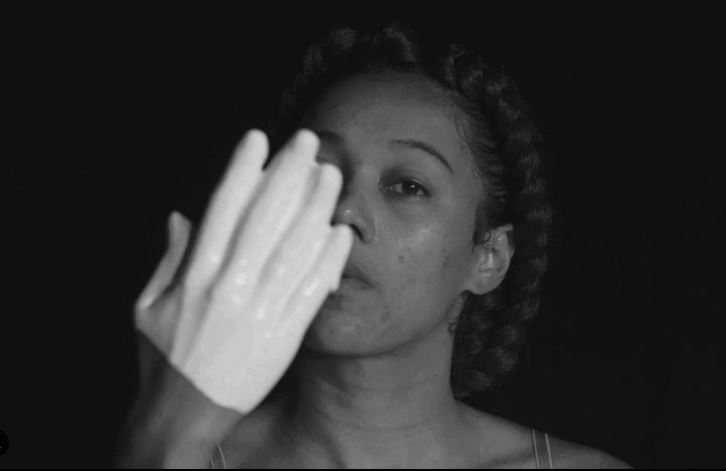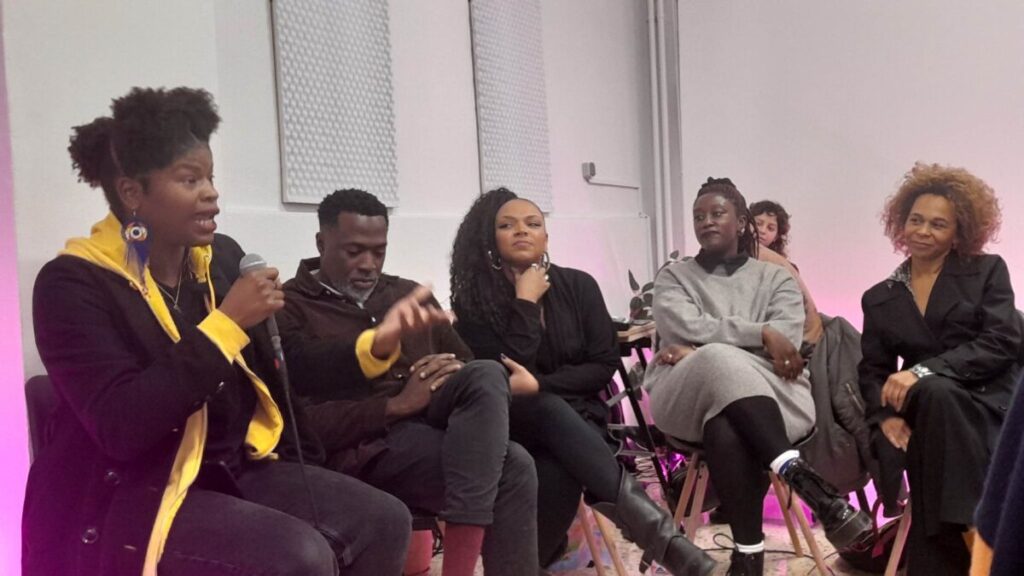Blackface: racism in disguise

Screenshot from the short film “Bonita” (2022) by Mariana França
“My childhood nightmare was masquerade parties. Always someone would have chosen to be the “black”, painted in dark paint, wearing a bone and an afro wig. The highlight: at one such party, my uncle’s wife came dressed like this” … and no, it wasn’t funny.
This is one aspect of the blackface phenomenon, as shared by artist Idra Kayne in a discussion on “Political Correctness in Public Discourse” at the 5th Balkan Can Kino Film Symposium in November. As a child of a mixed family herself, she wanted to share how a kid feels facing such an image, because there is no “politically correct” explanation on why someone is dressed “black”.

Grace Nwoke, Nikos-Deji Odubitan, Idra Kayne, Anna Paspati, Deborah Odong
To paint a white person “black”, no matter on how “good” intentions, is in fact a racist act. And finally, how innocent is it for someone to try to elicit laughter or sympathy by exaggerating the external physical characteristics of the black race or by representing racial stereotypes to which they clearly feel superior themselves? It doesn’t take a modern history lesson or to know what minstrel shows were to understand that the caricature of a man can hide nothing more than the intention to mock and a deep need to assert his authority and control over someone he considers and treats (over time) as inferior.
While we are talking about embracing diversity and making social inclusion reality, we face the fact that we have not yet conquered the basics as a society and ignore the obvious: when someone organizes an event “to honor the black race”, as was recently done in a bar in Athens, calling staff and customers to paint themselves “black”, is not honourable in any imaginable way. Such a “celebration” is deeply offensive, nothing more than a themed masquerade party to which not everyone is invited. Certainly not the “honored” persons! Imagine seeing – in a parallel universe – the locals of Kinshasa, Congo painted in white paint honoring the large Greek community of their city by organizing bucolic parties dressed in traditional Greek costumes and turning spits -as done in many Greek festivities- to the sounds of folklore clarinets.
And if something like this really seems brought from a parallel universe which we will never cross paths with, how would it be like to see a black actor painted white for the needs of a performance? In Greece, for example, it is almost a common practice for actors in the theatre to be “forced” to disguise themselves as black people, because the script includes a black person in the story. The argument that has been heard about this practice is that – alas – “there are no black actors in Greece and who has the time to look for them now?”. The truth is of course that in Greece there are many black actors and actresses, such as Anna Paspati, Deborah Odong or Indra Kayne and many others. However, the undefined freedom of Art, but mainly the showbusiness marketing, presents this “harmless” twist (a white person disguised as black), as something that has nothing to do with the practice of blackface due to… good intentions and a lack of casting.
At this moment when words like diversity and inclusion are heard everywhere, while awards have even been established for companies that adopt inclusion policies, the visibility of the black community remains a(nother) hot potato for Greek society. Since art always reflects the social context in which it is created or performed, the moment we see Indra simply playing Maria the neighbor in a soap opera, or when it wouldn’t be announced on breaking news that a black actress will play Antigone, then we will believe that inclusion is not a unicorn.
Note: this unicorn is black, not “colored” and certainly not “blacky”.
The discussion was broadcasted live by Fade Radio and revolved around the history of the practice of blackface and its disturbing resurgence, inclusion and political correctness in art and public discourse. It was attended by, among others: Idra Kayne (actress, singer, radio presenter), Anna Paspati (actor), Nikos-Deji Odubitan (founder and director of Generation 2.0 for Rights, Equality and Diversity), Deborah Odog ( actor), Yiannis-Kandea Papadopoulos (cinema critic at Athinorama), Kostas Arvanitis (journalist at Luben.tv) etc.
Listen to the whole conversation here.

 Ελληνικά
Ελληνικά

